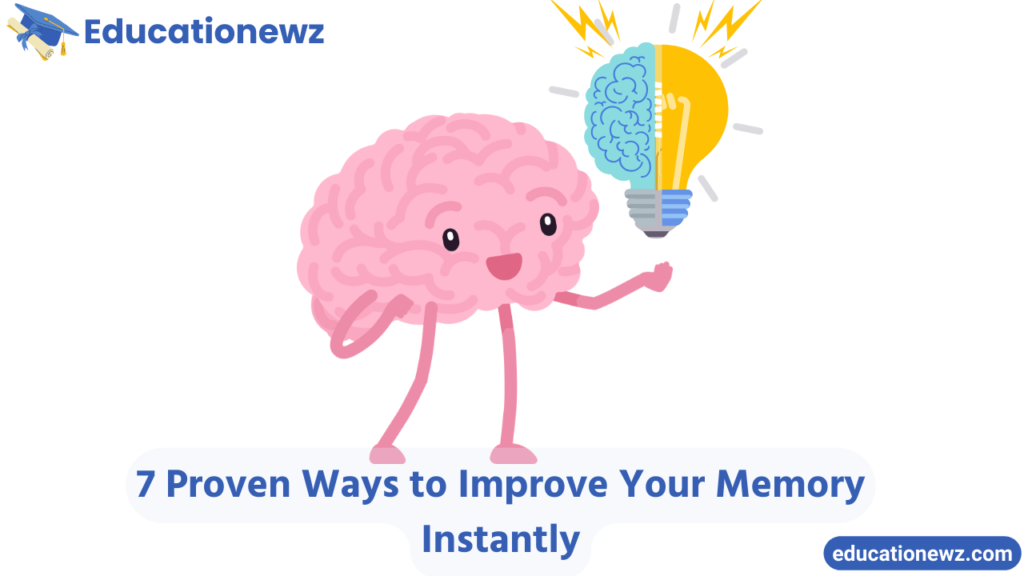To improve your memory, prioritize sleep, eat brain-boosting foods, exercise regularly, and practice mindfulness to enhance cognitive function and retention.
Memory is a cornerstone of human life, shaping our experiences, decisions, and relationships. Yet, memory lapses—whether minor or significant—are a common challenge for many. The good news is that memory is not static; it can be trained, nurtured, and significantly improved with the right strategies. How to Improve Your Memory: A Comprehensive, Science-Backed Guide will walk you through scientifically proven techniques, lifestyle changes, and brain-boosting tips to sharpen your mind and improve recall.
In this article, you’ll discover actionable insights supported by science, designed for anyone looking to enhance their cognitive capabilities. Whether you’re a student preparing for exams, a professional juggling tasks, or an older adult concerned about memory decline, these strategies will provide lasting benefits.
The Science Behind Memory: How Does It Work?
Understanding memory is the first step to unlocking its potential. The brain processes memory through three key stages:
- Encoding: Sensory inputs like sights, sounds, and experiences are transformed into a format the brain can understand and store. Think of it as your brain taking mental notes.
- Storage: Information is either held in short-term memory for immediate use or transferred to long-term memory for future retrieval. Repetition and the emotional or practical importance of the information play a big role in this transition.
- Retrieval: This is where your brain pulls up stored information, like recalling a name, fact, or experience when you need it most.
However, this finely tuned process can be disrupted. Factors like stress, poor sleep, or constant multitasking act like roadblocks, making it harder for your brain to encode, store, and retrieve information effectively.
Why Do We Experience Memory Lapses?

Before diving into How to Improve Your Memory: A Comprehensive, Science-Backed Guide, it’s important to recognize common causes of forgetfulness:
- Lack of Focus: Multitasking often leads to shallow encoding, reducing the chances of retaining information.
- Stress and Anxiety: High cortisol levels can impair memory formation.
- Poor Nutrition: Deficiencies in essential nutrients like omega-3 fatty acids and vitamins can weaken cognitive function.
- Inadequate Sleep: The brain consolidates memories during sleep, and lack of rest disrupts this process.
Addressing these underlying factors is a crucial first step in memory improvement.
Proven Strategies to Enhance Your Memory
Here are some practical, science-backed strategies to boost your memory:
1. Prioritize Quality Sleep
Sleep is essential for cognitive function and memory consolidation. Aim for 7-9 hours of quality sleep each night.
- Establish a consistent sleep schedule.
- Avoid blue light exposure before bedtime.
- Practice relaxation techniques like deep breathing or meditation.
2. Adopt a Brain-Healthy Diet
What you eat directly impacts your brain’s ability to retain information. Include these in your diet:
- Omega-3 fatty acids: Found in fish like salmon and walnuts, they support brain health.
- Antioxidants: Blueberries, spinach, and dark chocolate combat oxidative stress.
- Whole grains: Provide sustained energy for cognitive tasks.
| Food Group | Key Nutrients | Benefits |
|---|---|---|
| Fatty Fish | Omega-3s | Enhances brain function |
| Leafy Greens | Vitamins E and K | Improves cognitive abilities |
| Nuts & Seeds | Vitamin E and healthy fats | Protects against memory decline |
3. Exercise Regularly
Physical activity boosts blood flow to the brain, enhancing memory and overall cognitive performance.
- Aerobic exercises like running or swimming improve hippocampus health.
- Incorporate activities that combine mental and physical challenges, such as yoga or dance.
- Exercise for at least 30 minutes, 4-5 times per week.
Techniques to Sharpen Your Memory

1. Practice Mindfulness and Meditation
Mindfulness helps reduce stress and improves focus, which is essential for memory.
- Spend 10-15 minutes daily meditating.
- Focus on your breath or use guided meditation apps.
- Studies show that mindfulness enhances working memory.
2. Use Mnemonic Devices
Mnemonics are memory aids that simplify information:
- Acronyms: Create words using the first letters of a list (e.g., HOMES for the Great Lakes).
- Chunking: Break large information into smaller chunks.
- Visualization: Create mental images to represent concepts.
3. Stay Mentally Active
Mental exercises are vital to prevent memory decline.
- Engage in puzzles, crosswords, or Sudoku.
- Learn a new skill or language.
- Read diverse books to challenge your cognitive abilities.
The Role of Social Interaction
Human connection is vital for memory retention. Isolation can negatively impact cognitive health, while social interactions stimulate brain activity:
- Participate in group discussions or book clubs.
- Spend time with friends and family.
- Volunteering can also boost mental well-being.
Lifestyle Changes for Long-Term Memory Improvement

1. Manage Stress Effectively
Chronic stress is detrimental to memory. Practice stress management techniques such as:
- Deep breathing exercises.
- Journaling to organize thoughts.
- Engaging in hobbies that relax the mind.
2. Avoid Information Overload
Trying to retain too much information at once can overwhelm the brain. Instead:
- Break study or work sessions into smaller chunks.
- Take breaks to allow the brain to process information.
- Use apps to set focused intervals (e.g., Pomodoro timers).
The Key to Better Memory
Improving your memory isn’t about working harder—it’s about adopting smarter, science-backed strategies that make the process seamless and effective. Start by addressing the fundamentals:
- Reduce stress, as chronic stress can impair your brain’s ability to encode and retrieve information.
- Prioritize quality sleep, since rest is when your brain consolidates and strengthens memories.
- Focus on one task at a time, eliminating distractions to allow your mind to fully process information.
- Reinforce learning through repetition, ensuring that key details move into long-term memory.
Train Your Brain Like a Muscle
Your brain thrives on practice, much like a muscle. The more you engage it with intentional exercises, the sharper it becomes. Techniques such as visualization, where you imagine vivid images tied to information, or association, where you link new knowledge to familiar concepts, can make remembering effortless and enjoyable.
Why Memory Matters
Memory isn’t just about recalling facts—it’s the foundation of personal growth, relationships, and lifelong learning. By nurturing it, you’re not only boosting your academic or professional life but also enhancing how you connect with the world around you.
So, take the first step: embrace the science, integrate these simple habits into your daily routine, and watch your memory—and your confidence—reach new heights. Your brain is capable of incredible things. Train it, trust it, and let it amaze you.
FAQs
1. What is the most effective way to improve memory?
Consistent sleep, a balanced diet, regular exercise, and mental stimulation are the most effective ways to enhance memory.
2. Can meditation really improve memory?
Yes, meditation reduces stress and enhances focus, both of which are crucial for memory improvement.
3. How can I avoid forgetting important information?
Use techniques like mnemonics, note-taking, and repetition. Additionally, focus on single tasks to improve encoding.
4. What foods should I eat to boost memory?
Incorporate omega-3 fatty acids, leafy greens, and antioxidant-rich foods like berries into your diet.
5. Does age affect memory?
While aging can impact memory, adopting a healthy lifestyle and staying mentally active can significantly mitigate decline.
6. How does exercise improve memory?
Exercise boosts blood flow to the brain, supports the hippocampus, and reduces stress hormones that negatively impact memory.
7. Can technology help with memory?
Yes, apps for note-taking, reminders, and brain-training games can support memory improvement.
8. How long does it take to see improvements in memory?
With consistent efforts, noticeable improvements can occur within weeks to months, depending on the strategies employed.
How to Improve Your Memory: A Comprehensive, Science-Backed Guide
Improving your memory isn’t just about recalling facts—it’s about sharpening your mind and unlocking your brain’s full potential. Whether you’re a student, professional, or simply looking to maintain cognitive health as you age, the steps outlined in this guide offer proven strategies that anyone can implement.
By reducing stress, prioritizing sleep, staying focused, and using effective techniques like visualization and repetition, you’re not just boosting your memory—you’re enhancing your overall cognitive function. These are habits that will serve you well for years to come.
Remember, your brain is adaptable, and with the right tools, you can cultivate a mind that’s both sharp and resilient. The more you nurture your memory, the stronger it will become. Start today, and experience firsthand the transformative power of a well-trained, efficient mind! Please follow our blog Educationewz.



